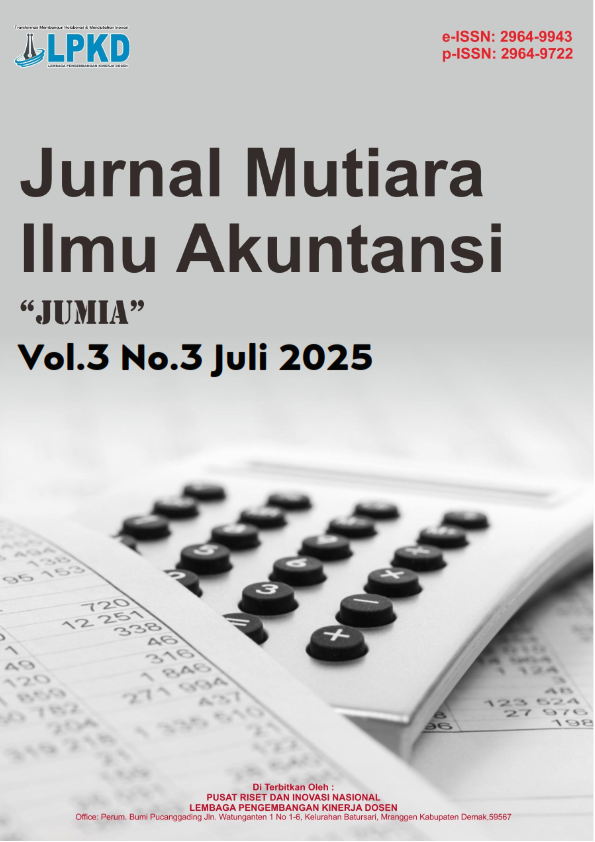Akad Dalam Sepakat: Akuntansi Bagi Hasil Nelayan Desa Campurejo
DOI:
https://doi.org/10.55606/jumia.v3i1.3547Keywords:
Profit-sharing, Fishermen, Accounting, EthnomethodologyAbstract
The purpose of this study is to determine the implementation of profit-sharing agreements among fishermen in Campurejo Village. Profit-sharing among fishermen is an agreement made by two or more parties with the shared goal of utilizing capital to generate profits. Profit-sharing has been practiced by Indonesian society for a long time, with its implementation usually carried out verbally without clear documentation. Another issue arising from profit-sharing is the limited access to capital sources for the majority of fishermen. This study uses a qualitative approach with an ethnomethodology method, and data collection techniques include documentation, interviews, and observation. Interviews were conducted with the "Juragan" fishermen and the "Belah" fishermen. The data analysis technique used in this study is data triangulation. The results of this study show that the profit-sharing practiced by the fishermen community in Campurejo Village follows the mudharabah profit-sharing model, with a profit-sharing ratio of 50% to 50% and 60% to 40%. The profit-sharing practiced by the fishermen community is in accordance with Sharia principles. The researcher recommends documenting transactions in a simple manner to strengthen cooperation with written evidence that will be useful in the future.
References
Coulon, A. (2008). Etnometodologi (Cet. III). Lengge.
Hidayat, T., & Asyafah, A. (1970). Paradigma Islam dalam metodologi penelitian dan implikasinya terhadap penelitian pendidikan agama Islam. Tadrib: Jurnal Pendidikan Agama Islam, 4(2), 225–245. https://doi.org/10.19109/tadrib.v4i2.2507
Pusparani, P. N., Setyaningtiyas, N., Astuti, A., & Sukur, G. (2023). Makna keharmonisan moderasi beragama dalam tradisi perang obor di Tegalsambi Jepara. Cendekia, 3(2), 158–176.
Rahmawati, R., & Yusuf, M. (2020). Budaya sipallambi’ dalam praktik bagi hasil. Jurnal Akuntansi Multiparadigma, 11(2), 386–401.
Saputra, I., & Kurniawan, R. (2021). Penerapan metode kualitatif dalam penelitian sosial. Jurnal Ilmu Sosial dan Pendidikan, 7(3), 123-137. https://doi.org/10.12345/jisp.7.3.123
Sari, M. D., & Tanjung, R. (2019). Pengaruh motivasi kerja terhadap kinerja pegawai negeri sipil. Jurnal Manajemen, 15(4), 217-229. https://doi.org/10.2345/jman.15.4.217
Syifa, S. Z. I., Sopanah, A., Anggarani, D., & Hasan, K. (2023). Mengungkap praktik akuntansi budaya dalam upacara adat pelantikan orang Kay Suku Kei Maluku. Owner, 7(3), 1999–2009. https://doi.org/10.33395/owner.v7i3.1518
Taufiq, A. (2018). Paradigma baru pendidikan tinggi dan makna kuliah bagi mahasiswa. Journal of Chemical Information and Modeling, 10(1), 40. http://www.e-jurnal.unisda.ac.id/index.php/madani/article/view/938
Wahyu, A. R. M. (2019). Sistem penggarapan lahan pertanian masyarakat: Perspektif ekonomi Islam. Al-Azhar Journal of Islamic Economics, 1(1), 1–15. https://doi.org/10.37146/ajie.v1i1.9
Wijaya, D., & Pratama, R. (2022). Faktor-faktor yang mempengaruhi keberhasilan implementasi teknologi informasi dalam pendidikan. Jurnal Teknologi Pendidikan, 10(2), 45-56. https://doi.org/10.56789/jtp.10.2.45
Downloads
Published
How to Cite
Issue
Section
License
Copyright (c) 2024 Jurnal Mutiara Ilmu Akuntansi

This work is licensed under a Creative Commons Attribution-ShareAlike 4.0 International License.








